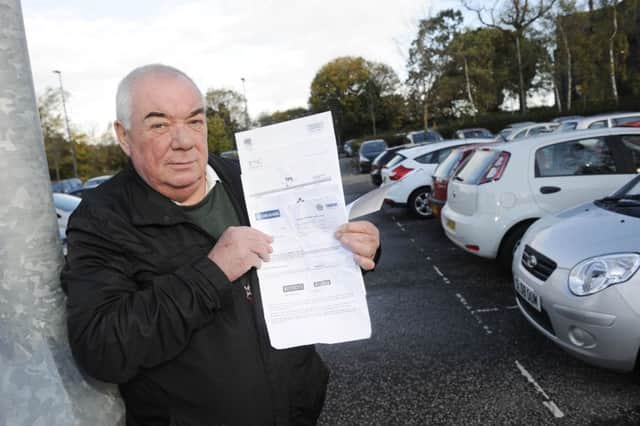Campaign aims to put brakes on steep parking charges


Jimmy Campbell, a bureau staff member in Midlothian, was so incensed by the amounts parking firms were commanding he persuaded his bosses to devote more resources to helping those affected.
Now the charity has held talks with civil servants in a bid to persuade the Scottish Government to take action.
Advertisement
Hide AdAdvertisement
Hide AdThe campaign, It’s Not Fine, reminds drivers that such penalties are charges and not fines or penalty notices which are issued by public authorities.
It also seeks to help those hit by disproportionate or unfair charges fight back.
Campbell’s interest in the matter was piqued after he was charged a three-figure sum following a shopping trip to an Edinburgh supermarket in 2013.
“We were already receiving more and more complaints. I began to challenge both the companies and debt collectors’ failure to respond to questions,” he said.
In the space of 12 months, Dalkeith and District Citizens Advice Bureau (CAB) assisted 112 people with complaints against parking charges, including a disabled mother-of-two who was charged for breaching the marked lines of a parking bay at a West Lothian shopping complex.
Others have been charged £200 for outstaying allotted time limits by as little as half an hour.
“Initially, we were one of the few bureaux taking up such complaints,” Campbell added. “Then Aberdeen joined us, and would ring down to ask for help with letters. It just grew and grew.”
Laws governing parking on private land differ across the UK. Operators lost the right to clamp or tow away vehicles in Scotland in 1992, while the procedure was only banned in England and Wales in 2012.
Advertisement
Hide AdAdvertisement
Hide AdThe latter reform also established an independent appeals process funded by trade body the British Parking Association (BPA), but this does not extend north of the border.
A rival organisation, the Independent Parking Committee (IPC), which represents 63 operators in Scotland, has subsequently started its own appeals process.
“When we saw what Jimmy was doing in Dalkeith it rang a lot of bells for us because we see a lot of complaints about unfair carparking fees right across the country,” said Fraser Sutherland, Citizens Advice Scotland consumer spokesman. “In fact it’s one if the most common consumer issues that people report to us.
“So we decided to use Jimmy’s work in Dalkeith as the base for a national campaign. We ran a survey on our website asking people across Scotland to report instances where they’d felt badly treated by a carpark, and we also did a lot of research on the issue, meeting ministers and industry reps.”
Those discussions prompted the establishment of a national action plan and a commitment by IPC to bring in more transparent appeals procedures.
“We’re working closely with Transport Scotland and Citizens Advice Scotland in order to provide improvements in Scotland,” said an IPC spokesman.
“The Supreme Court recently confirmed the legality and appropriateness of parking charges on private land in a case which extends to Scots law. The case supports the maximum charge of £100 that IPC and BPA members are limited to.
“Unfortunately, companies who are not members are free to charge whatever they like leaving the motorist vulnerable to excessive and unlawful charging.
Advertisement
Hide AdAdvertisement
Hide Ad“We would urge the Scottish Government simply to make it a requirement that anyone issuing private parking charges must be a member of an ATA as it is our responsibility to be improving the industry without demanding costly and unnecessary legislation when the tools already exist to make great improvements.”